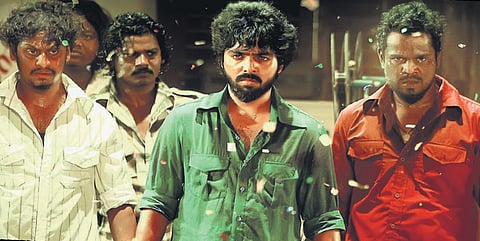

CHENNAI : Personal stories have always acted like a strong anchor for filmmakers who tread the tumultuous waters of film production, especially when it’s their first film. Director Nikesh RS, who hails from Munnar in Kerala, reveals that his drive to tell the story of his people was the biggest motivation for his debut film, Rebel. “This is a story that has stayed with me for several years and is something that I have personally seen while growing up. Even today, my relatives who work in tea plantations, toil for over 12 hours to get a meagre income. I wanted to make this as a tribute for them,” says Nikesh.
Based on a few real-life incidents that happened in the 1980s, Rebel will see GV Prakash playing the role of a college student who goes to pursue his college degree in Munnar, Kerala. In order to bring the 80s alive, Nikesh and his team worked tirelessly to get the details right. “From ensuring that we had the right costumes from the time, choosing buildings that suited the period, to creating art from that era, and sourcing bikes like Luna and Jawa, we got our basics right before filming the scenes,” he says.
Apart from GV Prakash, who also doubles up as the composer, Mamitha Baiju plays the female lead in the film. Explaining their character arcs, Nikesh shares, “GV Prakash’s journey to becoming a rebel is the main element of the film. His struggle in college changes his character and perspective completely. Mamitha’s role isn’t just restricted to being the lead’s love interest. She too would transition into someone very crucial for the shift in the story.”
Nikesh believes that it is important to become a rebel in order to stand for the oppressed. “We have showcased the pain of the people living in Munnar. GV Prakash’s character, who is the son of a daily wage labourer, stands up for injustice against the Tamils. This has happened to 3 lakh Tamilians in Kerala during the time. This would be significantly highlighted in the film. Rebel would be a strong film for Tamil people.”
Expected to be politically charged and intense, Rebel delves into the protagonist’s struggle to fit in a place where harassment against Tamils was rampant. Nikesh, who understands the seriousness of the script, notes that he has worked on the dialogues – both Tamil and Malayalam – patiently for a year. Nikesh elaborates, “This is an issue that is persistent in many states. For the film to not have a one-sided perspective, I have added narratives from several others who had similar experiences.” Even though the story revolves around clashes between people from two different states, the makers were clear about not wanting Rebel to be one-sided. “We wanted to show that we aren’t picking a side while talking about a crucial issue. Instead, we mounted the story on the communal and linguistic harmony between the two states.”
Nikesh assures that despite handling a sensitive issue, Rebel has its heart in the right place and does not intend to create a rift between the two cultures. With several films celebrating the camaraderie between Tamilians and Malayalis including Premam, Hridayam, Joe and the recent Manjummel Boys, the director confidently proclaims that Rebel too would tread on the same path. “Initially, we were worried about how the audience would understand the number of Malayalam dialogues in the film, but with us celebrating their films like our own, I gained confidence in my work,” he adds.
Debuts are crucial in how they shape the identity and the career of a filmmaker. On whether he is anxious about the audience reception, the debutant says, “The impression that the first film creates, charts the audience’s expectations for my upcoming films, so I have ensured that Rebel ends up being a fulfilling and entertaining experience.”